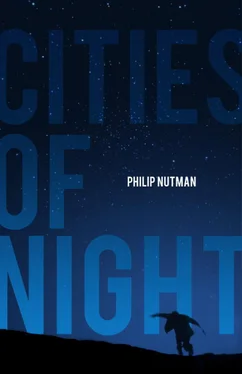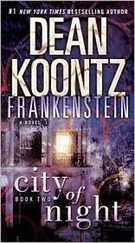Philip Nutman - Cities of Night
Здесь есть возможность читать онлайн «Philip Nutman - Cities of Night» весь текст электронной книги совершенно бесплатно (целиком полную версию без сокращений). В некоторых случаях можно слушать аудио, скачать через торрент в формате fb2 и присутствует краткое содержание. Город: Toronto, Год выпуска: 2012, ISBN: 2012, Издательство: ChiZine Publications, Жанр: Ужасы и Мистика, на английском языке. Описание произведения, (предисловие) а так же отзывы посетителей доступны на портале библиотеки ЛибКат.
- Название:Cities of Night
- Автор:
- Издательство:ChiZine Publications
- Жанр:
- Год:2012
- Город:Toronto
- ISBN:978-1-92685-185-3
- Рейтинг книги:4 / 5. Голосов: 1
-
Избранное:Добавить в избранное
- Отзывы:
-
Ваша оценка:
- 80
- 1
- 2
- 3
- 4
- 5
Cities of Night: краткое содержание, описание и аннотация
Предлагаем к чтению аннотацию, описание, краткое содержание или предисловие (зависит от того, что написал сам автор книги «Cities of Night»). Если вы не нашли необходимую информацию о книге — напишите в комментариях, мы постараемся отыскать её.
Eight cities.
Three continents.
One voice.
From Atlanta to Blackpool, London to New York, from Rome, Italy to Albuquerque, New Mexico via Hollyweird and the city of Lost Angels, all are cities of night.
And the night is forever. Now.
Cities of Night — читать онлайн бесплатно полную книгу (весь текст) целиком
Ниже представлен текст книги, разбитый по страницам. Система сохранения места последней прочитанной страницы, позволяет с удобством читать онлайн бесплатно книгу «Cities of Night», без необходимости каждый раз заново искать на чём Вы остановились. Поставьте закладку, и сможете в любой момент перейти на страницу, на которой закончили чтение.
Интервал:
Закладка:
The brougham came to a halt at the corner of Union Street and Cheap Street and waited behind a line of other carriages waiting to enter the square in front of the Abbey. Drawing close to the entrance to the Pump Room, the driver opened the door. Van Helsing, in his adopted persona as the Baroness’s personal physician, alighted first and took her hand, gently coaxing her from the carriage to the flagstones. Then, ever-present battered brown valise in hand, they entered Lord Manfred’s den of iniquity.
Van Helsing’s Journal. Entry undated (loose pages found in the back of the book).
Whiles my professional life often times entails social gatherings, I far prefer my own company or that of close friends, for true friendship must never be taken for granted as life itself should never be. For the sake of friendship with the Baroness I was here; and for the sake of those children who, I had no doubt, had fallen into the hands of some malign agent.
The Pump Room proved an aesthetic delight, a most harmonious assembly of antique furniture and Georgian design. Lord Manfred spared no expense on his personal decoration. Thousands of candles illuminated globes of fine Venetian glass which remind me of the light inside Notre Dame de Paris when the devout burn many, many votives. Garlands and bouquets of flowers from all over Europe, including the beloved tulip, festooned the walls and tabletops, their rich scents mingling in the warm air. A smorgasbord of exotic fruits and vegetables complemented an array of meats to make the butcher proud: watermelon from the Americas, mangoes from the Caribbean, star fruit from Asia. A small ensemble played Mozart from the tiny stage as, masked in the style of the Venice carnivale, Lord Manfred’s guests mingled.
The face may don a disguise, though sometimes reputation is too grand to hide beneath a simple covering. Floating close to our host in a manner which denied his size was a figure I immediately surmised as Monsieur Boullan, the Parisienne sorcerer and compatriot of Eliphas Levi, practitioner of dark arts whom I had met once through Bulwer-Lytton. What strange company you keep, Lord Manfred.
As if reading my mind, our host removed himself from a tête-à-tête with a rotund individual I subsequently discover was Mr. Oliver Gaye, the Major of Bath, in whom’s name this charade had been arranged.
“Your Ladyship,” Manfred said, taking the Baroness by the hand, bowed and kissed her fingers with a flourish I can only describe as both theatrical and of the feminine manner, a touch I found both surprising and distasteful, for the Baroness had not inform me Lord Manfred was a habitué of the Mollie House. I tryed not to flinch when he limply took my hand for I find the activities of sodomites an abomination in the eyes of God Almighty. “Doctor Van Helsing, how good of you to escort your patient and allow her to attend my little soirée. ’Tis an honor, sir, to have a physician of such standing join us this evening; I have heard much of your work in anatomy at the Royal College.” This also surprise me, for I had no inkling this degenerate member of British aristocracy was to know who I am. Yet before I could question him on this account, a young lady whose deportment could not hide her true nature, approached, whispering in his ear, and Lord Manfred excused himself to speak with another guest.
Like the cuckolded husband, I saw then the truth behind the lie; social decorum is but a fancy curtain drawn to conceal the baseness of certain human natures. Behind this façade of eccentric gentility stood moral corruption like the voyeur who peer out from a dark recess. Gathering my wit, I realized that many of the gentlemen guests were older and single, their corpulent frames draped by the attentions of young women who, like the harlot who guided Lord Manfred away, were professional companions — not the gutter Mackerel I had become so accustomed to see on London’s foul streets, but “ladies” who live in fine houses which discreetly administer to the base needs of wealthy married men.
I asked the Baroness if she knew of whom the revellers were. “That is Admiral Ducket with the petite sparrow; that is General Kitchen in conversation with those girls I believe are twins. Like many who now reside in Bath, they are retired and are either widowers or have never married, such as the General. They say he was married to his troops,” she informed me.
“I fear you have misled me, friend Baroness; I did not know you were so familiar with either Lord Manfred or so many of the burghers of Bath,” I said.
“Professor, my dear sir, for once your reason has deserted you. How can a woman of my social standing, a frequent visitor to this fair city, not have encountered its most prominent citizens?” she reply. But before I could quiz her further, Lord Manfred returned and took her by the elbow. “Forgive us please, Doctor; I must have a word with your ‘patient’ and introduce her to someone,” he said before guiding the Baroness away from me to stand alone.
I felt then like the foolish fly who finds itself trapped in the web of the spider, for no doubt now resided in my mind the Baroness had deceived me, though for what purpose I could not then guess. But, as often, I am getting ahead of myself, and it is only through Grace of God I am here, back at my chambers in Holland Park, barely able to recount this tale for my hand does shake.
Feeling himself obtrusive and vulnerable so close to the center of the Pump Room, and not wishing to invite the unwanted attentions of the bordello girls, Van Helsing withdrew to a corner table where he accepted a glass of wine from a masked waiter. Giving the room close scrutiny, the Professor was disturbed to find that Monsieur Boullan had disappeared from sight — no mean feat for a man who stood close to seven feet tall. If Boullan’s presence troubled him, Van Helsing was disquieted by the fact the Baroness Lewis, judging by her relaxed manner in Lord Manfred’s company, knew their host so well. Why had she deceived him? And more importantly, why had she brought him here?
The Professor tried to recall what little he knew of Lord Manfred. Aleister Manfred was a lower member of British aristocracy, related to the throne on Prince Albert’s side. Other than that, all he knew the Baroness had told him. That Lord Manfred had been expelled from Cambridge University, where he had been studying philosophy, for some scandalous incident, the details of which no one would dare speak. Apparently, the incident in question had so upset Lord Manfred’s father that the old man passed away suddenly, just days before, or so it was rumoured, according to the Baroness, he planned to disinherit his wayward son and sole heir.
Rumour, Van Helsing thought, was an English disease that afflicted many of the landed class, slithering serpent-like through the drawing rooms and salons of London. Several leading Unitarians, a small cadre of those who, like himself were committed to social reform, shunned the Baroness’s good works with the poor and children of the workhouse. For Baroness Lewis, too, had been the source of some rumours, which painted her in a less than flattering light. Van Helsing had heard, but dismissed, gossip that Arabella Lewis was responsible for the passing of her husband; that she was a woman of boundless appetites and had worn the man into an early grave. All of which sounded like poppycock to the Professor; the late Baron Lewis had been forty years’ Arabella’s senior, but that was hardly surprising in Victorian society as many a member of the landed gentry who were gaining in years and had no heir took younger, robust women as their wives. And it was no secret that the late Baron’s first wife had died during childbirth many, many years ago. The occurrence had so broken the Baron’s heart that he had spent the next thirty years living alone, reclusively in the family estate in Kent. Then one day, seeing his mortality facing him on the horizon, beckoning him towards a dusty death, the Baron decided to take another wife and father an heir.
Читать дальшеИнтервал:
Закладка:
Похожие книги на «Cities of Night»
Представляем Вашему вниманию похожие книги на «Cities of Night» списком для выбора. Мы отобрали схожую по названию и смыслу литературу в надежде предоставить читателям больше вариантов отыскать новые, интересные, ещё непрочитанные произведения.
Обсуждение, отзывы о книге «Cities of Night» и просто собственные мнения читателей. Оставьте ваши комментарии, напишите, что Вы думаете о произведении, его смысле или главных героях. Укажите что конкретно понравилось, а что нет, и почему Вы так считаете.












